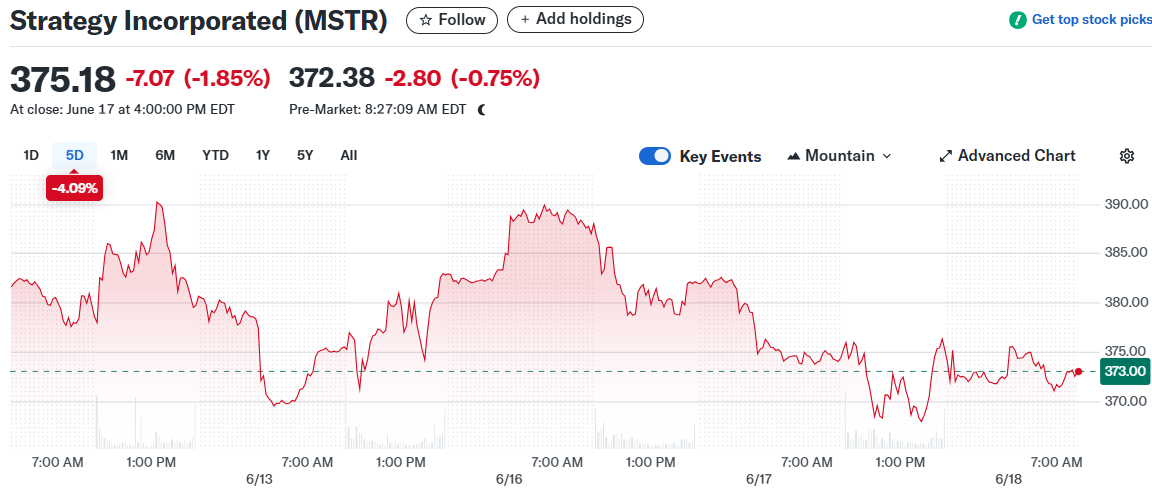TLDR
- MicroStrategy has issued over $3 billion in preferred stock with yields up to 11.5%, far higher than typical bank preferreds at 6%
- The company owns $62 billion worth of Bitcoin, representing about 3% of global supply, but lacks clear cash flow to pay preferred dividends
- Wall Street analysts remain bullish with 11 of 13 giving Strong Buy ratings, though the stock holds a Zacks Rank #3 (Hold)
- Critics question the sustainability of 10% cash dividends from a money-losing software business with only $460 million in sales
- CEO Michael Saylor defends the strategy, calling it a “Bitcoin-backed security” that captures arbitrage between Bitcoin gains and funding costs
MicroStrategy has been making waves in financial markets with its unconventional approach to funding its Bitcoin strategy. The company has issued over $3 billion in preferred stock with eye-catching yields reaching 11.5%.

The business intelligence firm’s latest preferred offering, known by the ticker STRD, raised $1.2 billion in early June. This perpetual preferred carries a 10% dividend rate and currently trades around $87, well below its $100 face value.
The company’s other two preferred issues show similar patterns. The convertible STRK trades at $104 with a 7.7% yield, while the non-convertible STRF trades at $103 for a 9.7% yield.
These yields dwarf what investors can get from traditional preferred stocks. Bank preferreds from companies like JPMorgan Chase typically yield around 6%.
Funding Questions Spark Debate
The high yields have attracted attention from both supporters and critics. Capital Group, the major Los Angeles investment firm, holds chunks of the first two preferred deals according to Bloomberg data.
But not everyone is convinced. Chris Bloomstran from Semper Augustus Investments has been vocal about his concerns. He questioned how a company with a struggling software business could commit to paying 10% cash dividends.
The software side of MicroStrategy generates only $460 million in annual sales. The business operates at a loss, leaving questions about where dividend payments will come from.
MicroStrategy’s preferred dividends total about $300 million annually. CEO Michael Saylor has made clear he doesn’t want to sell Bitcoin to make these payments.
The company could suspend preferred dividends if needed without triggering default. This differs from bond payments, where missing interest leads to immediate problems.
Saylor addressed funding concerns in a Bloomberg interview on June 10. He described the preferred stock as money the company “never has to pay back” due to their perpetual nature.
Bitcoin Strategy Drives Everything
Saylor’s entire strategy rests on Bitcoin continuing to appreciate faster than his funding costs. He cited Bitcoin’s 57% annual gains over the past 4.5 years compared to his 10% preferred costs.
The company now holds $62 billion worth of Bitcoin, representing 3% of the world’s total supply. This Bitcoin holding is worth nearly six times the company’s total debt and preferred obligations.
Trading volume in MicroStrategy preferreds exceeds that of any bank preferred stocks. The unusual structure has created its own market dynamic.
Saylor believes demand for Bitcoin far exceeds the roughly 450 coins worth $50 million that miners produce daily. This supply constraint supports his bullish outlook.
TD Cowen analyst Lance Vitanza backs the strategy. He sees the preferred offerings creating a new channel for high-yield fund flows into Bitcoin exposure.
Wall Street analysts generally remain optimistic about MicroStrategy. Of 13 analysts covering the stock, 11 rate it a Strong Buy with one Buy rating.
The average brokerage recommendation sits at 1.38 on a scale where 1 represents Strong Buy. This puts MicroStrategy firmly in bullish territory among Wall Street firms.
However, the Zacks ranking system tells a different story. MicroStrategy holds a Zacks Rank #3, which translates to Hold rather than buy.
The consensus earnings estimate for the current year remains at negative $15.73 per share. Analysts haven’t changed this view over the past month.
The disconnect between brokerage optimism and earnings reality reflects MicroStrategy’s unique position. Traditional metrics don’t capture the Bitcoin bet that drives everything.
MicroStrategy’s common shares traded down 1.9% to $375 on Tuesday, while Bitcoin fell 2.7% to $104,000.






